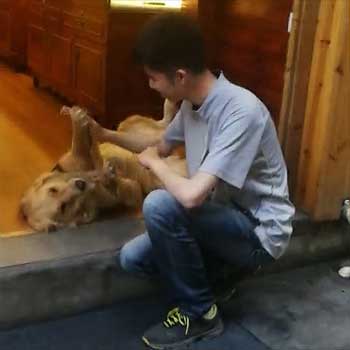
Zhuoyuan Zhang
I completed my BSc Biological Sciences from Fudan University in 2017. A friendship with a street cat formed in that period of time made me choose to study for a Master of Applied Animal Behaviour and Animal Welfare in Edinburgh. My master’s dissertation focused on people’s attitudes towards positive animal welfare science. Both the study of animal welfare science and encounters with dogs and their human friends in the parks in Edinburgh inspired me to do a PhD on the topic of dog-human relationship.
My PhD project is aimed at exploring how to be in communion with domestic dogs, with a concentration on their positive experiences. Communion is defined as in Longman Dictionary of Contemporary English (Procter, 1978): “a special relationship with someone or something which makes you feel that you understand them very well.” This project follows this explanation, and stresses that when one is in communion with animals, her or his understanding of them is not gained through reasoning or thinking about animals’ behaviour analytically, but rather through direct and spontaneous experiences, which make one feel that s/he is genuinely connected with animals.
This project will explore the following questions:
- What actions and patterns of thought can one cultivate to promote communion with domestic dogs?
- How does one cultivate these actions and patterns of thought? (What difficulties might one face during the process and how can they be overcome?)
- Can one identify a variety of domestic dogs’ positive experiences through being in communion with them?
- What are these positive experiences?
- To what general understanding of positivity might such a study contribute?
This project will be carried out by using an autoethnographic methodology. Essentially autoethnography uses researchers’ own experiences as data for analysis and discussion (Ellingson & Ellis, 2008). It can enable researchers “to describe an experience in a way that ‘outside’ researchers never could” (Adams et al., 2015, p. 31). Autoethnographic methodology is appropriate for this project mainly because (1) whether one is in communion with animals can be directly known only by reflecting on one’s own experiences; (2) through introspection, one can track the process of cultivating her or his own actions and patterns of thought.
